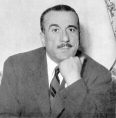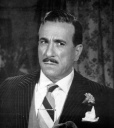Born in Naples, August 26, 1903, until the age of five living in Caivano with the nurse, then despite some strength back in his family. Six years after its debut in theaters in the Valley of Rome, "Poverty and Nobility" Scarpetta, in part Peppeniello, the son of Felice Sciosciammocca.
He studied piano, and continues to play so the mother will follow saltuario.Quando 'Titin in his first tour, will live' for two years in World War College Chierca.Durante works in Naples with Vincenzo Scarpetta, in 1920 entered the theater company Molinari (where he meets Toto), the New Theatre, then works with the company dialect Francis Corbinci Partenope at Theater.
In 1927 he joined the Society of Vincent Scarpetta, occupying the place of his brother Edward moved to Carini-Falconi.In followed the two brothers, thanks to Michael Galdieri, offering "The magazine will not like" gaining good gradimento.Il October 10, 1929 married Adela Carloni, and the year after his son Louis was born.
Eugene Aulicino impresario of the Teatro Nuovo in Naples, took the two brothers instead of Toto in the theater already 'working Titina and three give rise to a level art called "The theater humorous Neapolitan Eduardo De Filippo and Peppino with Titina", there are also Tina Pica, Carlo Pisacane, Augustine and John Salvietti Berardi.Nel '31 give you a new nickname "The Humor Company Theatre De Filippo."
This form of Peppino was founded in 1966 during the telecast of the week "Royal Flush". Peppino after the first few episodes feel rather uncomfortable in the role of simple presenter, meeting 'in the memory a character created many years ago in the comedy "The cases are two "the exchange of data (in the play the character's name was Gaetano Espositi), tweaking the characteristics and behold Pappagone television phenomenon of the year sessanta.Il character was so successful that it becomes the last mask in Italian, with his colorful language and full of neologisms that takeover 'in everyday language for that periodo.Alcuni his catchphrases were: "ecque qua," "anzio," pirichè "gnorsì", "many funeral"
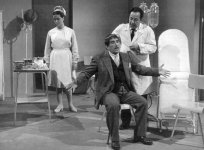
My name Pappagone, I am a big ignoramus. When I speak Italian do not know if I am Syrian, turkish, russian, or that ... and I tell you the piriche ': When I came to the world the brain hath been 'lost. A poorly created language the tongue me 'nguajata. My hair on the head, Always rough and rebellious, occiput a Riccetto is more 'stupid I look. Yeah I know I'm stupid, but happy are the same. Gia 'that the world is you once, When agrees that the life you the amusements without measuring the distance. If you want to live happy, not hear what they say. Go and see the bachelor you are always free. If you want to star in a good mood recarti no doctor you can treat yourself diseases always being in good company. Those who usually complains the luck accompanies it. If you want to make many friends, facts previously strong enemies. Diran that you're sincere Only if you tell the truth. Do not go out with the umbrella when out of time and 'beautiful. When the storm breaks, eat pepper, bread and salt ... More 'I can not rhyme and finally I agreed. This story, of course, does not help, it instructs. And 'only served to feel happily. Now fo 'horns and bicorna and I'm going back home. Pappagone leaves ecque repeating here!
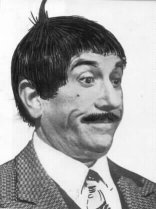
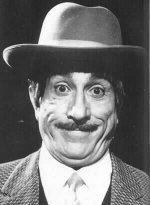
Rhyme of "Gaetano Pappagone"

Chitarrata d'ammore
Nannina tene 'o core 'nfus' 'o ffele,
nun fa 'na cosa si nun me fa male.
Pure pe cchesto 'a voglio bene assaje
ca nun m' 'a putarraggio maje scurdà.
'A cunuscette dinto primmavera
quanno 'o solo è lucente comme a ll'oro
e comme a ll'oro dint'a ll'uocchie tene
'na luce ca te struje e te pò cecà!
Si m'hadda da' 'nu vaso sulamente
me 'o dà cu 'nu mussillo amaro e astrinto
ca me turmenta e nun me sazia maje
j'e desiderio me fa spantecà!
Tene 'e capille nire e anelle anelle...
'na faccia delicata 'e madunnella,
ll'uocchie curvine e 'na vocca 'e curallo
ca 'n'ata eguale nun se pò truvà.
Capisco quanno dice 'na buscìa
e quanno pe' dispietto è 'nfama assaje,
ma è tanta 'a frennesia 'e vulerle bene
ca si m'accide bene me farrà!
Comme te dà 'na gioia te dà 'na pena,
e sape vulé male e vulé bene.
Ma si doce te guarda e t'accarezza
te dà 'o calore d' 'a felicità.
Si sulo m'hadda di' ca me vò bene
primma m' 'o ddice e doppo m'avvelena
cu 'nu dispietto o pure nu' capriccio
ca 'o core me fa chiagnere e penà.
E' 'ntussecosa, sì, ma quanno dice
"Te voglio bene"... allora so' felice.
Allora 'a gioia me trase 'int' a 'stu core
pure si nun ha ditto 'a verità.
E' tanto capricciosa ca 'nu sciore
'e vvote 'a fa felice... e pe' 'nu mare
'e bene e de ricchezze è indifferente
e 'o core te fa strujere e 'mpazzì.
Ma quanno 'a tengo stretta 'int'a 'sti bbracce
e ca me vasa e m'accarezza 'a faccia...
nun ce stanno puntiglie né capricce
che 'a dint' 'o core m' 'a ponno levà!
Don Rafele 'o trumbone
A Neapolitan farce in one act written by Peppino de Filippo in 1931.
Raffaele Chianese, composer, teacher of trombone, lives in a house-music store in total poverty, with his wife Amalia and her daughter Lisa, it has been unemployed for two years, and all for his visionary nature and refractory to new visions of life that are not his. Raphael lives for music and there's no way to change his mind: even the last place of work offered by his best friend, the godfather John, was refused by him. That day is an important day: Raphael must go and play at a wedding in the afternoon, after yet another failure of the Federation, where they told him that there is no work for him. Seems to be fine until it comes in a threatening Nicola Belfiore, performer and colleague Raffaele, who brings bad news: her husband died of cardiac paralysis. The performer, who had long suspected that Raphael has some sort of power that led him to bring bad luck to anyone who happens to pitch, he wants to stop doing business with the trombone and tells him that from that day you will go to own way. At that moment, John enters the radiant appears: he found a job for Raffaele. An offer truly up for grabs: vigilant staff in a mill owned by his friend Commander. Raphael makes a face: for him, has a job to "spy" as he calls. After that appears to explain in what consists of salary and conditions, Raphael ponders: has it in mind to go, taking salary in advance that will give you the time of hiring and vanish into thin air. On hearing this, the gossip goes. First, however, warns him: If you will also miss this opportunity, he will no longer know where and who to contact. It seems that everything is for the better, if at some point some people come into the store, very well dressed. Raffaele agents are afraid of taxes, but suffered the most well dressed of them said his name was Alfredo Fioretti and be a composer. Fioretti try Raffaele including proposed very advantageous: for years, in fact, he is in Italy idle and need someone to follow him in his concerts around the world. Raphael seems to be the right person for the job. At first Raphael seems uncertain how he will with his wife and daughter? And with the documents? Fioretti says he thinks all his secretary, Attilio Gargiulo. Meanwhile Louis Fioretti's brother, Alfredo, to Raffaele explains everything that will do: go to France, Germany, Africa, all over the world. Raffaele asks about the money. Fioretti, in response, gives him an advance of ten thousand pounds. Raffaele and his wife Amalia almost faint: they had never seen so much money put together in one fell swoop. Re-enter the godfather John. Raffaele treats him to fish in the face, dangling in his face ten thousand pounds given to him by business Fioretti. John does not understand the reason for the refusal and when Amalia tries to explain everything, is suddenly interrupted by Raffaele. Eventually John, offended and humiliated, he decided that Raffaele is a madman, a patient and that never again will affect his troubles. Released appear yelling, Fioretti looks at his watch. It's late: she has an appointment with Ambassador of Spain to a dinner. So out, accompanied by his brother and the secretary. Raphael and Amalia are happy: their troubles seem to be finally finished. Re-enter Luigi, who takes over the business five thousand pounds, and said to Raphael how things really are: Alfredo Fioretti is really crazy, the last descendant of a very wealthy family who fancies himself a great musician. Those who were presented as Luigi Gargiulo Fioretti and Attilio are actually the two nurses who accompany him in his daily walk. Alfredo always does: he's crazy, and "should be pitied." As for money, it was only paper. Luigi apologized for the inconvenience arrecatogli and leaves as if nothing had happened. Raffaele E and then Amalia returned to live in utter misery.
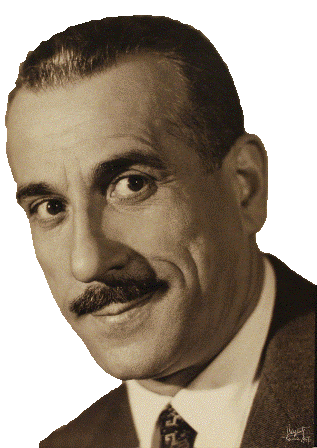
Peppino
de
Filippo
“Equequa!”
“Sono scorfano di padre e di madre”
At the age of 22 years is engaged in the company of Salvatore De Muto, the last Pulcinella.Dopo the death of Eduardo Scarpetta, natural father of De Filippo argued that even economically, Goofy and 'forced to accept the need for companies to work in precarious .
In the '32 De Filippo are Sannazzaro of Naples with "Who is cchiù happy 'and me "by Eduardo and" Flirting with spring "of Peppino.Nello Peppino plays the same year his first film" Three Men in a frak. "Following a golden age in which the three brothers achieved success in all Italian theaters, Then December 10, 1944 Diana theater in Naples, the "Company Theater Humor I De Filippo" melts misunderstandings between Eduardo and Peppino.
That same December Peppino Theatre IV is the Fountains of Rome "Defendant stand up" and "You've never been so beautiful." In '45 it separates from his wife, and made his debut with his new company in Milan, at the Olympia Theatre, with "The cases have two." Spin the length and breadth of Italy with "Those days" for two consecutive seasons will well from 1959 to 1969 266 repliche.Dal Taetro manages the Arts in Rome. In 1971 Livia disappears Maresca, his partner in art and life. In '77 married Clelia Mangano, his partner in the company.
Peppino has success all over the world in '56 he toured in South America and Spain, in '63 he went to Paris where he received an award for his work "The metamorphosis of a busker" in '64 and 'guest London Theatre dell'Aldwich; in '65 is in Prague and the Soviet Union, Yugoslavia and in '66 is in Switzerland in '69 in Portugal, Spain and France, returned to London in '74.
Popular film actor and star of the television that offers many of his works; in '66 to "Royal Flush" (Canzonissima) proposes huge success with the character of Pappagone.
Peppino disappears January 26, 1980.
Pappagone

